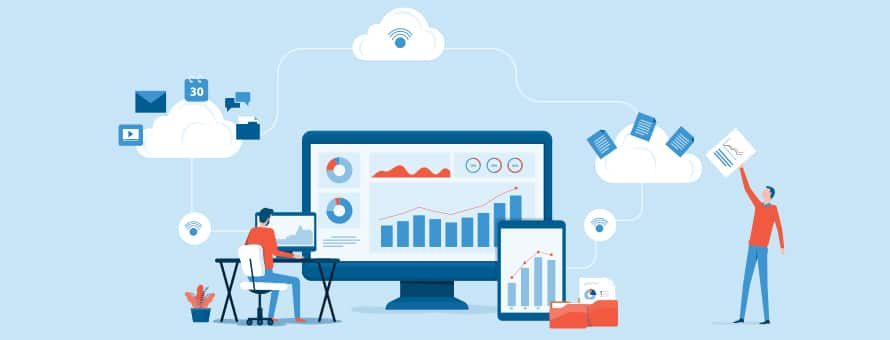What is Cloud Computing?

Understanding the numbers
When reviewing job growth and salary information, it’s important to remember that actual numbers can vary due to many different factors—like years of experience in the role, industry of employment, geographic location, worker skill and economic conditions. Cited projections are based on Bureau of Labor Statistics data, not on SNHU graduate outcomes, and do not guarantee actual salary or job growth.
When you stream your favorite album online, shop at an e-commerce store or answer your work email from your home computer, you’re reaping the benefits of cloud computing. But what does that really mean?
"To explain cloud computing, it's good to start with understanding what the cloud is," said Dr. Gary Savard, senior associate dean of computer science at Southern New Hampshire University (SNHU) with more than three decades of experience as a software engineer and architect.
He said to imagine the cloud as a rental service for computer storage. "The cloud is a way to 'borrow' some space that another company, such as Amazon, Google or Microsoft, already has in a physical location," he said.
So, What Does Cloud Computing Mean?
According to Savard, cloud computing is a form of computing in which networks, data storage, applications, AI tools, security and development tools are all enabled via the internet rather than a local computer or an on-premise server in your organization.
He said cloud services are generally a pay-as-you-go model that are scalable and usually cheaper than owning your own services, which makes them particularly appealing to many businesses.

“Companies are moving to the cloud because it makes it easy to deliver high-quality customer experiences without the complexity of maintaining data centers full of expensive computing equipment,” said Jonathan Kamyck, a senior associate dean at Southern New Hampshire University (SNHU). Kamyck is also an (ISC)2 Certified Information Systems Security Professional (CISSP) with a master's in information assurance.
“The cloud makes it easier for companies of all sizes to increase their competitiveness," he said.
If you want to get started in this dynamic field, it’s important to understand the different types of cloud computing and what you can do with them.
Types of Cloud Computing
From global brands to tech start-ups, organizations are finding new ways all the time to use cloud computing to offer services, protect data and run their businesses.
Currently, there are three primary types of cloud computing models:
Infrastructure as a Service (IaaS)

IaaS provides users access to hosted computing resources, such as networking, processing power and data storage, said Adam Goldstein, an adjunct instructor of STEM programs at SNHU with over 20 years of experience in information security.
IaaS provides the basic building blocks for cloud-based IT, offering infrastructure like firewalls and virtual local area networks. Amazon Web Services (AWS) and Microsoft Azure are two common examples of IaaS.
Platform as a Service (PaaS)
PaaS provides access to a platform within which users can develop and build custom software and applications, said Goldstein.
With PaaS, developers can focus on the creative side of app development, without having to manage software updates and other infrastructure. Magento Commerce Cloud is an example of PaaS commonly used by e-commerce companies to build and manage custom online stores.
Software as a Service (SaaS)
SaaS allows users to subscribe to a fully functioning software service that is run and managed by the service provider, Goldstein said.
With SaaS, the end-user only has to focus on how they will use that particular piece of software within their business. They don’t have to think about how the service is maintained or how infrastructure is managed. An example of SaaS is Microsoft Office 365, in which all Microsoft Office applications are available in a browser without installing them on a local computer.
What is Cloud Computing Used For?
Among the different types of cloud computing services, there are many different uses of cloud computing across virtually every industry.
"Resources that were once dedicated to purchasing, installing, configuring, and maintaining traditional computing networks can be redirected to focus on solving core business problems and exploring new opportunities,” Kamyck said.
![]() So what are examples of cloud computing uses? According to Kamyck and Goldstein, cloud computing drives many of the popular personal and enterprise services consumers use every day. This includes collaboration suites like Google Apps and Microsoft Office 365 as well as learning management systems used by schools, streaming services and internet-hosted video games.
So what are examples of cloud computing uses? According to Kamyck and Goldstein, cloud computing drives many of the popular personal and enterprise services consumers use every day. This includes collaboration suites like Google Apps and Microsoft Office 365 as well as learning management systems used by schools, streaming services and internet-hosted video games.
With media streaming services, for example, content is delivered over the internet and consumed immediately instead of through files downloaded and saved to a user’s computer, Kamyck said.
Another example of cloud computing in action is AWS, said Goldstein. AWS provides cloud services to run Amazon, one of the largest e-commerce sites in the world.
The use of cloud computing doesn’t end with shopping and music streaming, however. Most people are likely engaging with cloud-based services in some way throughout their daily lives.
“Software services and applications, large and small database hosting, gaming, data warehousing and internet of things are just a few of the things that people are doing in the cloud,” said Goldstein.
Who Uses Cloud Computing?
Because there are so many applications for cloud computing across a range of industries, there is also a wide variety of jobs that use cloud computing on a daily basis.
![]() “Almost all IT jobs will have some interaction with the cloud,” said Goldstein. “System administrators, network engineers, software developers, IT architects, database administrators and cybersecurity engineers all may use cloud services on a regular basis.”
“Almost all IT jobs will have some interaction with the cloud,” said Goldstein. “System administrators, network engineers, software developers, IT architects, database administrators and cybersecurity engineers all may use cloud services on a regular basis.”
It doesn’t matter what your niche is in the technology space, according to Kamyck.
"Cloud computing affects everyone," he said. "Technology managers, analysts, software developers, cybersecurity experts, networking engineers, and system administrators are all being challenged to understand the cloud and learn how to harness it to benefit their organizations.”
Opportunities in these fields are growing, according to data from the U.S. Bureau of Labor Statistics (BLS), with roles for database administrators projected to grow 9% by 2033.* Software developer jobs are expected to grow 17% and jobs for computer network architects are projected to grow 13% over the same time period, BLS said.* That's pretty significant given that BLS reports the average growth for all occupations is 4%.*
Workers with cloud computing expertise will be well-positioned to advance in a variety of these career paths in the coming years, Kamyck said.
Find Your Program
How to Get Into Cloud Computing
The first step toward landing a job in cloud computing is to focus on professional training and education.
 Get Cloud Computing Education
Get Cloud Computing Education
Because cloud computing is becoming a core part of most technology fields, a bachelor’s degree in computer science, information technology, information systems or cybersecurity is an important step toward a cloud computing career.
Goldstein said that many of the technical skills needed for success in cloud computing jobs can be gained through IT and computer science degree programs, including:
- System administration and networking
- Scripting and coding
- Application programming interface (API) development
- Data storage and management
“A degree or higher education certificate program focused on those applied technical skills with hands-on learning is really beneficial to acquire a variety of skills,” said Goldstein.
For students who know they want to specialize in cloud computing, online training programs focused on those specific technical skills can be a valuable addition to a degree program. SNHU, for instance, offers the "Amazon Web Services Cloud Foundations" course, which helps prepare students for the AWS Certified Cloud Practitioner exam.

SNHU's master's in computer science also offers a graduate-level course on cloud computing.
In "Cloud Computing Platforms," Savard said students will be exposed to a variety of visualization technologies and learn to find the proper solutions to various common scenarios. "Students will also get hands-on experience and comparing common industry cloud services," he said.
And the master's in computer science won't just teach you about computing, according to Savard. It will give you a broad understanding of the field. "By having this wholistic understanding, students will be able to effectively interact with cloud services for development purposes," he said.
Read more: What Do the Best Computer Science Master's Degrees Look Like?
 Get Professional Experience
Get Professional Experience
![]() Because cloud computing is constantly evolving, getting hands-on industry experience is another important step toward a career. A cloud computing internship is a great way to start working in the field and gain key technical and soft skills needed in the industry.
Because cloud computing is constantly evolving, getting hands-on industry experience is another important step toward a career. A cloud computing internship is a great way to start working in the field and gain key technical and soft skills needed in the industry.
Cloud computing internships are a great way to start working in the field and gain key technical and soft skills.
Students studying computer science can also work on their own cloud-based projects building websites, games or other applications to add to a portfolio of work and gain experience with specific cloud technologies.
“The quickest path to a career in cloud computing is to choose a well-known platform like Amazon AWS or Microsoft Azure, sign up for a low-cost account, and start tinkering with their technologies,” said Kamyck.
 Get Certified in Cloud Computing
Get Certified in Cloud Computing
Earning professional certifications in cloud computing is another important step toward working in the field.
![]() After someone has gained selected a cloud platform and is ready for formal training, professional certification programs that emphasize hands-on learning are a great next step, Kamyck said.
After someone has gained selected a cloud platform and is ready for formal training, professional certification programs that emphasize hands-on learning are a great next step, Kamyck said.
AWS, for example, offers an entry-level Cloud Practitioner certificate and the more advanced AWS Certified Solutions Architect (CSA) certificate.
Additional certifications from AWS, Microsoft and Google focus on other more advanced skills, including cloud architecture, cloud development, systems administration, cloud security and machine learning.
No matter what path you take to land a job in cloud computing, you’ll gain key skills that can help you start and grow a successful career in technology and prepare you for industry changes ahead.
“Cloud computing is rapidly evolving and will become more and more important to companies over the next decade. Technology professionals that build experience and skills with cloud technologies now will reap the benefits of their efforts for years to come,” said Kamyck.
*Cited job growth projections may not reflect local and/or short-term economic or job conditions and do not guarantee actual job growth. Actual salaries and/or earning potential may be the result of a combination of factors including, but not limited to: years of experience, industry of employment, geographic location, and worker skill.
Danielle Gagnon is a freelance writer focused on higher education. She started her career working as an education reporter for a daily newspaper in New Hampshire, where she reported on local schools and education policy. Gagnon served as the communications manager for a private school in Boston, MA before later starting her freelance writing career. Today, she continues to share her passion for education as a writer for Southern New Hampshire University. Connect with her on LinkedIn.
Explore more content like this article

What is Environmental Science?

Academic Spotlight: Tyra Davey, Associate Dean of STEM Programs

What Does an Environmental Scientist Do?
About Southern New Hampshire University

SNHU is a nonprofit, accredited university with a mission to make high-quality education more accessible and affordable for everyone.
Founded in 1932, and online since 1995, we’ve helped countless students reach their goals with flexible, career-focused programs. Our 300-acre campus in Manchester, NH is home to over 3,000 students, and we serve over 135,000 students online. Visit our about SNHU page to learn more about our mission, accreditations, leadership team, national recognitions and awards.


